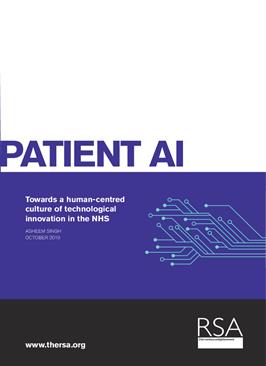This short paper reflects on a collaboration between the RSA and NHSX which sought to understand the ways in which radical technologies, such as artificial intelligence and automated decision systems, are influencing commissioning and clinical practice in the health system.
We aimed to:
- Understand through appreciative inquiry commissioner, clinician and patient interactions with radical technologies
- Surface barriers and pain points and how we might overcome them
- Provide NHSX with ideas to improve the quality of adoption, the cultural environment in which adoption takes place and thus improve clinician experience and raise the quality of care.
Our summary findings and recommendations to NHSX are:
- Patient adoption of radical technologies, such as AI, is key to their successful integration in the health system – and is key to creating a genuine culture of innovation in the NHS. Commissioners recognise that innovations and processes that bring clinicians along with managers and integrate seamlessly into the clinical workflow are more likely to endure than ‘big bang’ interventions. All actors in the system, from commissioners to citizens, have an interest in fostering a culture of patient adoption. This involves consultative and deliberative processes that actively engage clinicians and citizens in conversations that surface ethical and practical considerations around the ingress of radical technologies and address training and cultural needs.
- Evidence is essential: clinicians and patients alike trust interventions that build from a robust evidence base. Evidence, piloting and sandbox-style initiatives can help overcome multiple residual issues around implementation, from misalignment of financial incentives, to misalignment of corporate and clinical cultures and patient expectations.
- A network of designated clinical AI champions should be platformed as an important part of the AI proposition. This would not be a network of hero-professionals; rather they would largely be system-focussed public entrepreneurs who work below the radar to help shift attitudes and practices and provide inspiration to others so as to collectively build a culture of innovation.
Download the report
Find out more about the work in our short video:
pdf 330.5 KB
Contributors

